Weird Ways Genghis Khan Screwed Up The World (or Made it Better)
Nathan Johnson
Published
09/12/2016
in
wow
Genghis Khan was one of the most important figures in human history.
- List View
- Player View
- Grid View
Advertisement
-
1.
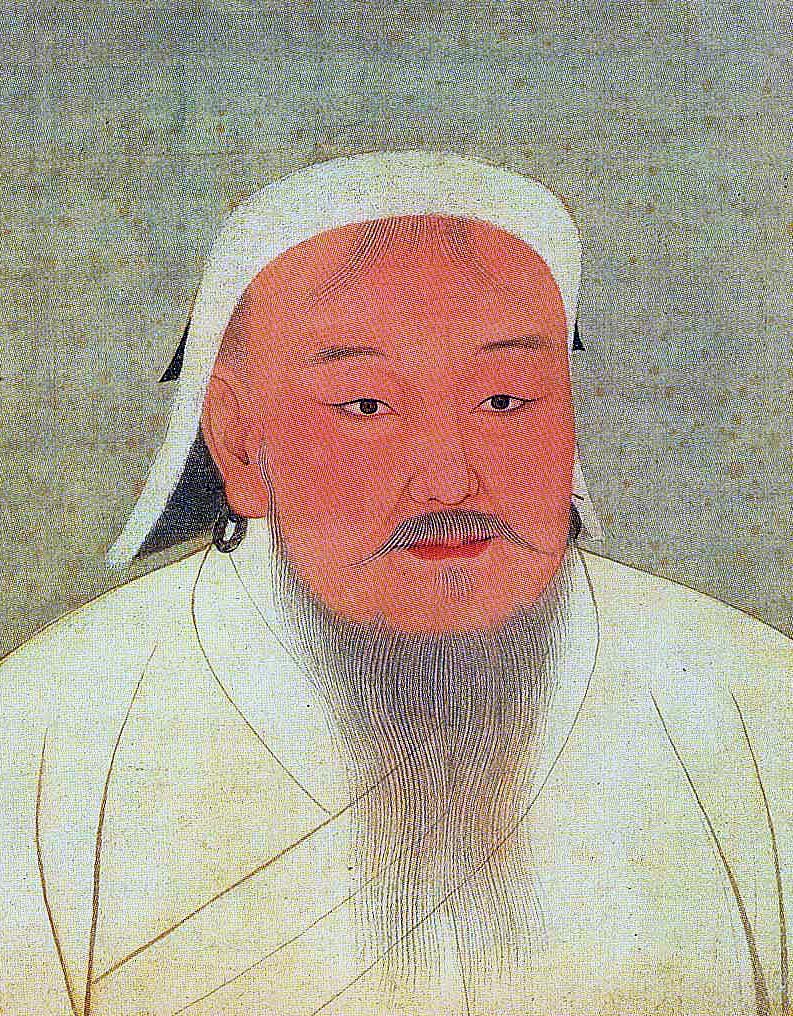 Genghis Khan was one of the most important figures in human history. Not just because of what he did himself, but also because of all that happened as a consequence of what he did. Most of what he actually did involved slaughtering a whole crap-load of people, and running a shockingly large barbarian empire. By 1279 (about 50 years after his death), the empire he started was the largest territorial empire in human history. But the consequences of his actions were that he changed the entire world: in some ways, his actions completely messed up the world, in others, you could say he made the world better (at least, in the 'big picture'). Regardless, the modern would probably look nothing like it does now if someone had strangled this guy in his crib. He's a rule-breaking time-traveler's wet dream. So let's take a look at some of the biggest changes in world history that happened only because of this bloodthirsty barbarian warlord!
Genghis Khan was one of the most important figures in human history. Not just because of what he did himself, but also because of all that happened as a consequence of what he did. Most of what he actually did involved slaughtering a whole crap-load of people, and running a shockingly large barbarian empire. By 1279 (about 50 years after his death), the empire he started was the largest territorial empire in human history. But the consequences of his actions were that he changed the entire world: in some ways, his actions completely messed up the world, in others, you could say he made the world better (at least, in the 'big picture'). Regardless, the modern would probably look nothing like it does now if someone had strangled this guy in his crib. He's a rule-breaking time-traveler's wet dream. So let's take a look at some of the biggest changes in world history that happened only because of this bloodthirsty barbarian warlord! -
2.
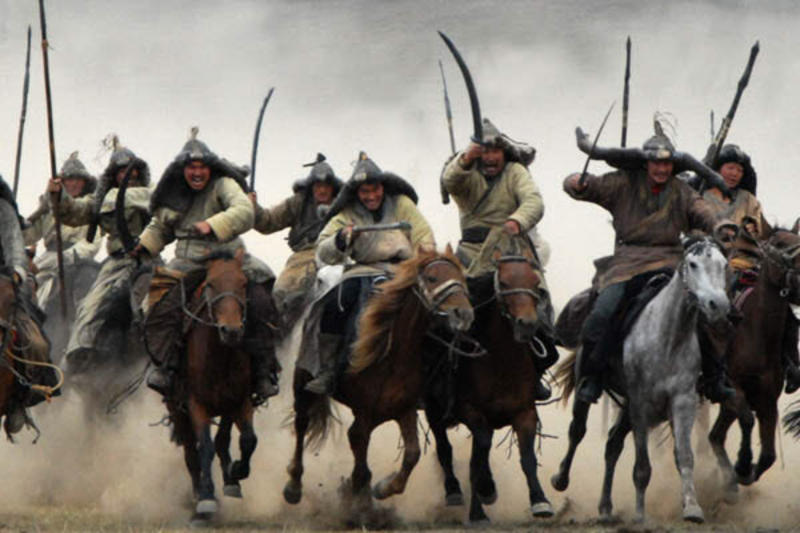 Genghis Khan began the Mongol conquest of China; it would be completed by his grandson Kublai Khan several decades later. China was not in a strong position to defend itself from the Mongols; the great Song dynasty had already been partially conquered in the north by a lesser-known barbarian tribe: the Jurchen. At the time of Genghis' invasion of northern China, there were about 50 million people in the region; by the end of it, there were only 8.5 million. Try to imagine an invasion where more than four out of five people in your community ended up gone! China's psychological scarring from the Mongol invasion and their subsequent rule was intense. It's not that the Mongol dynasty of China was actually that terrible after they won; they ruled for over a hundred years, and the Mongols adopted Chinese culture and became civilized pretty fast. Their government was multicultural and relatively tolerant (though the native Chinese were second class citizens). The real problem is that the Dynasty that came before that, the Song, were so amazing. They had been the very height of Chinese culture and civilization. They had made amazing breakthroughs in science, technology, learning, philosophy, art, and even personal freedoms and civil rights. The Song were so amazing that when the Chinese finally got rid of the Mongols, the new dynasty (the Ming) pretty quickly got stuck in the past: they venerated the Song and the past in general so much that they became ultra-conservative, rejecting change and new ideas. Essentially, because of the trauma they suffered from the Mongols, Chinese culture became too nostalgic to allow enough room for innovation. This meant that because of Genghis Khan, China would become too rigid to have a chance of developing things like the Enlightenment or the Industrial Revolution. While modern China is finally opening up to the world and embracing new ideas, a lot of the traditionalism in their culture is still a hang-up from Genghis.
Genghis Khan began the Mongol conquest of China; it would be completed by his grandson Kublai Khan several decades later. China was not in a strong position to defend itself from the Mongols; the great Song dynasty had already been partially conquered in the north by a lesser-known barbarian tribe: the Jurchen. At the time of Genghis' invasion of northern China, there were about 50 million people in the region; by the end of it, there were only 8.5 million. Try to imagine an invasion where more than four out of five people in your community ended up gone! China's psychological scarring from the Mongol invasion and their subsequent rule was intense. It's not that the Mongol dynasty of China was actually that terrible after they won; they ruled for over a hundred years, and the Mongols adopted Chinese culture and became civilized pretty fast. Their government was multicultural and relatively tolerant (though the native Chinese were second class citizens). The real problem is that the Dynasty that came before that, the Song, were so amazing. They had been the very height of Chinese culture and civilization. They had made amazing breakthroughs in science, technology, learning, philosophy, art, and even personal freedoms and civil rights. The Song were so amazing that when the Chinese finally got rid of the Mongols, the new dynasty (the Ming) pretty quickly got stuck in the past: they venerated the Song and the past in general so much that they became ultra-conservative, rejecting change and new ideas. Essentially, because of the trauma they suffered from the Mongols, Chinese culture became too nostalgic to allow enough room for innovation. This meant that because of Genghis Khan, China would become too rigid to have a chance of developing things like the Enlightenment or the Industrial Revolution. While modern China is finally opening up to the world and embracing new ideas, a lot of the traditionalism in their culture is still a hang-up from Genghis. -
3.
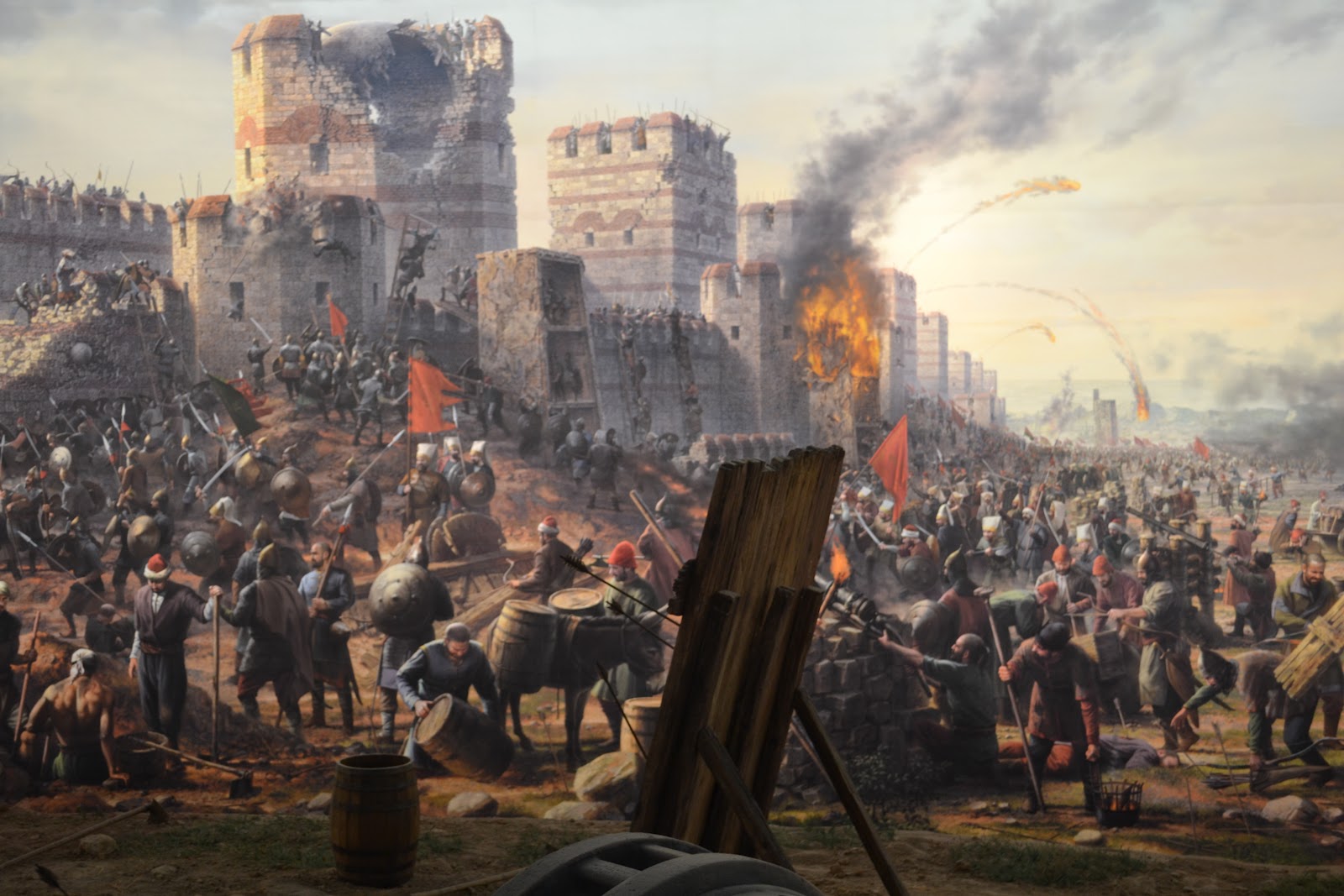 Genghis' plans amounted to world conquest, and eventually his Mongol forces spread out across central Asia to reach the heartland of the Muslim world. And they pretty much devastated it. Baghdad, which was at that time the capital of the Abbasid Caliphate, was besieged and destroyed. It was the greatest city in the Muslim world, and one of the greatest in the world at that time. It was a center of learning and culture; the Great Library of Baghdad (called "The House of Wisdom") was the great seat of the Islamic intellectual tradition. The Mongols destroyed it, and threw all its books into the river, which was said to have turned black with ink. They also killed about 90000 of Baghdad's citizens (their invasion of the Middle-East had a total death toll of around 2 million). Now, by the time the Mongols had shown up, the Muslim world was already in a state of decline; their culture had shifted over the last few centuries from one that held a very open worldview of intellectual inquiry and spiritual diversity within Islam, to one that was more literalist, fundamentalist, and distrustful of knowledge outside conservative Islamic religious teaching. But even in the 13th century there was still a large school of thought in the Islamic world that believed in a less fundamentalist and more innovative world-view. After the Mongols rampaged through destroying everything in their path, this was mostly gone; it would never fully reassert itself. Much like in China, the Middle East after the Mongols became more traditionalist, more conservative, and more fundamentalist in their world view, trapped in a reactionary perspective that made it difficult for them to innovate or adapt to new ideas. Some modern Islamists try to blame the West for Islam's decline, but it was really the Mongol hordes that psychologically scarred the Muslim world so badly that it never recovered. Even in recent years, eight centuries after Genghis, no less than Osama Bin Laden would bring up the Mongol destruction of Baghdad in his speeches. If it hadn't been for Genghis, we probably wouldn't have ISIS.
Genghis' plans amounted to world conquest, and eventually his Mongol forces spread out across central Asia to reach the heartland of the Muslim world. And they pretty much devastated it. Baghdad, which was at that time the capital of the Abbasid Caliphate, was besieged and destroyed. It was the greatest city in the Muslim world, and one of the greatest in the world at that time. It was a center of learning and culture; the Great Library of Baghdad (called "The House of Wisdom") was the great seat of the Islamic intellectual tradition. The Mongols destroyed it, and threw all its books into the river, which was said to have turned black with ink. They also killed about 90000 of Baghdad's citizens (their invasion of the Middle-East had a total death toll of around 2 million). Now, by the time the Mongols had shown up, the Muslim world was already in a state of decline; their culture had shifted over the last few centuries from one that held a very open worldview of intellectual inquiry and spiritual diversity within Islam, to one that was more literalist, fundamentalist, and distrustful of knowledge outside conservative Islamic religious teaching. But even in the 13th century there was still a large school of thought in the Islamic world that believed in a less fundamentalist and more innovative world-view. After the Mongols rampaged through destroying everything in their path, this was mostly gone; it would never fully reassert itself. Much like in China, the Middle East after the Mongols became more traditionalist, more conservative, and more fundamentalist in their world view, trapped in a reactionary perspective that made it difficult for them to innovate or adapt to new ideas. Some modern Islamists try to blame the West for Islam's decline, but it was really the Mongol hordes that psychologically scarred the Muslim world so badly that it never recovered. Even in recent years, eight centuries after Genghis, no less than Osama Bin Laden would bring up the Mongol destruction of Baghdad in his speeches. If it hadn't been for Genghis, we probably wouldn't have ISIS. -
4.
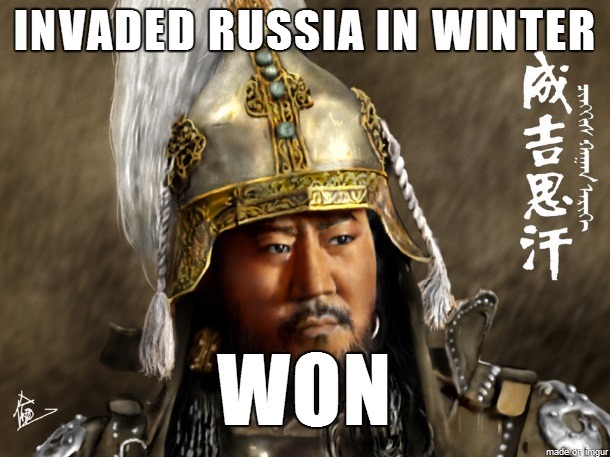 The Mongol hordes didn't stop at the Middle East; they also went to the Russian steppes, and -you guessed it- destroyed pretty much everything in their path. The area today known as Russia was a sparsely-settled collection of city-states at the time, but were just on the verge of forming an actual national construct centered on the city of Kiev (in modern-day Ukraine). Then the Mongols came and screwed everything up. In the early 13th Century they tore through the entire region, destroying every single major city west of Poland, except Novgorod (who survived by paying tribute and becoming a vassal-state). As for Kiev, the Mongols slaughtered almost everyone in the city and razed it to the ground. The descendants of the Mongols who had invaded Russia came to be known as the Golden Horde, and they dominated the region for the next hundred and fifty years or so. What became the modern Russian identity was forged around rebellion against Mongol domination. The city states that weren't totally wiped out were allowed to exists as vassals paying tribute to the Horde, but eventually the Duchy of Muscovy (Moscow today) grew in power, and in the late 15th Century managed to throw off Mongol domination and unite its rival cities, under the rule of Ivan the Great. The long rule of the Mongols retarded the growth of the entire region, and kept Russia a backward land compared to Europe for hundreds of years. The culture and political conditions that emerged from what was needed to overthrow the Golden Horde left Russia forever separate from the European States. The culture of the "strongman" leader we see today in Vladimir Putin (and back through history, from Stalin to the Russian Czars) traces all the way back to Ivan. A lot of why Russians are.. well, the way they are, is thanks to Genghis Khan.
The Mongol hordes didn't stop at the Middle East; they also went to the Russian steppes, and -you guessed it- destroyed pretty much everything in their path. The area today known as Russia was a sparsely-settled collection of city-states at the time, but were just on the verge of forming an actual national construct centered on the city of Kiev (in modern-day Ukraine). Then the Mongols came and screwed everything up. In the early 13th Century they tore through the entire region, destroying every single major city west of Poland, except Novgorod (who survived by paying tribute and becoming a vassal-state). As for Kiev, the Mongols slaughtered almost everyone in the city and razed it to the ground. The descendants of the Mongols who had invaded Russia came to be known as the Golden Horde, and they dominated the region for the next hundred and fifty years or so. What became the modern Russian identity was forged around rebellion against Mongol domination. The city states that weren't totally wiped out were allowed to exists as vassals paying tribute to the Horde, but eventually the Duchy of Muscovy (Moscow today) grew in power, and in the late 15th Century managed to throw off Mongol domination and unite its rival cities, under the rule of Ivan the Great. The long rule of the Mongols retarded the growth of the entire region, and kept Russia a backward land compared to Europe for hundreds of years. The culture and political conditions that emerged from what was needed to overthrow the Golden Horde left Russia forever separate from the European States. The culture of the "strongman" leader we see today in Vladimir Putin (and back through history, from Stalin to the Russian Czars) traces all the way back to Ivan. A lot of why Russians are.. well, the way they are, is thanks to Genghis Khan. -
5.
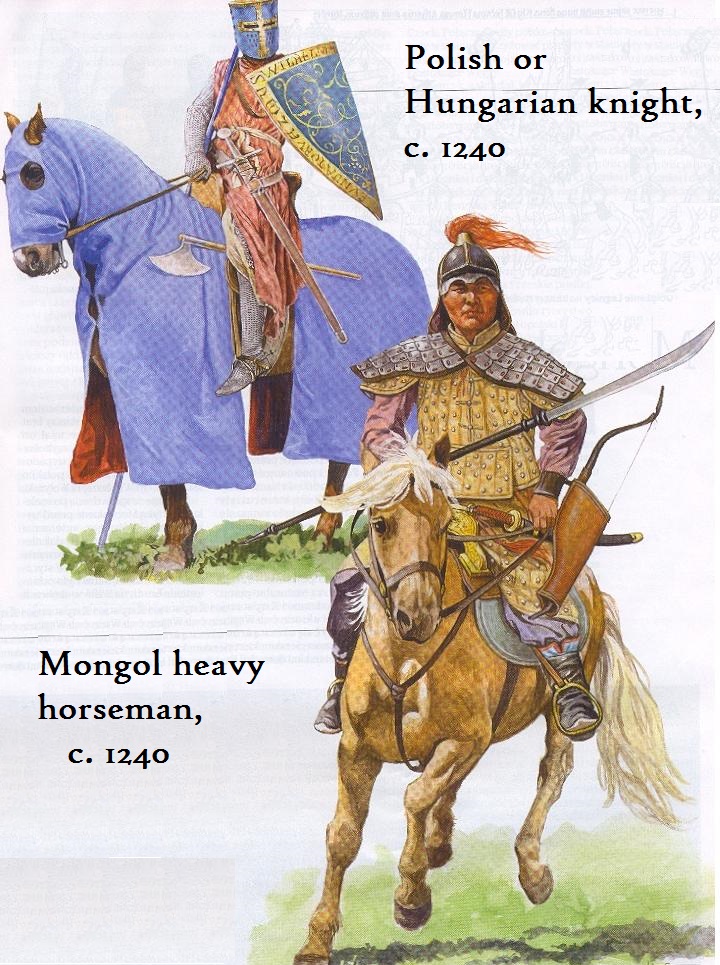 The Golden Horde descended from Genghis Khan's dream of world-conquest had no plans to stop with Russia. They wanted to sweep over all of Europe. The only reason we aren't all speaking Mongol today is that they weren't able to get past Poland and Hungary, who paid a great price in defending Europe from the Horde. They invaded Hungary twice, and Poland three times. In the first Polish invasion they killed the High Duke of Poland (Henry the Pious) and much of the Polish nobility at the Battle of Legnica, where the Poles were forced to defend Europe alone when other European monarchs refused to join the fight. And in their Hungarian invasions, they actually ended up slaughtering half that country's entire population! Neither Hungary nor Poland ever really decisively defeated the Mongols, they just didn't let themselves be defeated either. Europe had more concentrated population and more infrastructure than the Russian city-states, and the Poles and Hungarians were better able to fight a long war of attrition (on and off for the whole second half of the 13th Century). In the first great invasion of those two countries, the Horde allegedly stopped because their leadership was forced to go all the way back to Mongolia to elect the new Great Khan; but modern historians recognize that this may have been more of a convenient excuse than anything else, as the attempted invasion faced too much resistance. Even though the casualties among the Hungarians was enormous, the casualties for the Mongols was much more than they were used to as well. The Mongols just couldn't afford to keep pushing, so Europe was saved.
The Golden Horde descended from Genghis Khan's dream of world-conquest had no plans to stop with Russia. They wanted to sweep over all of Europe. The only reason we aren't all speaking Mongol today is that they weren't able to get past Poland and Hungary, who paid a great price in defending Europe from the Horde. They invaded Hungary twice, and Poland three times. In the first Polish invasion they killed the High Duke of Poland (Henry the Pious) and much of the Polish nobility at the Battle of Legnica, where the Poles were forced to defend Europe alone when other European monarchs refused to join the fight. And in their Hungarian invasions, they actually ended up slaughtering half that country's entire population! Neither Hungary nor Poland ever really decisively defeated the Mongols, they just didn't let themselves be defeated either. Europe had more concentrated population and more infrastructure than the Russian city-states, and the Poles and Hungarians were better able to fight a long war of attrition (on and off for the whole second half of the 13th Century). In the first great invasion of those two countries, the Horde allegedly stopped because their leadership was forced to go all the way back to Mongolia to elect the new Great Khan; but modern historians recognize that this may have been more of a convenient excuse than anything else, as the attempted invasion faced too much resistance. Even though the casualties among the Hungarians was enormous, the casualties for the Mongols was much more than they were used to as well. The Mongols just couldn't afford to keep pushing, so Europe was saved. -
6.
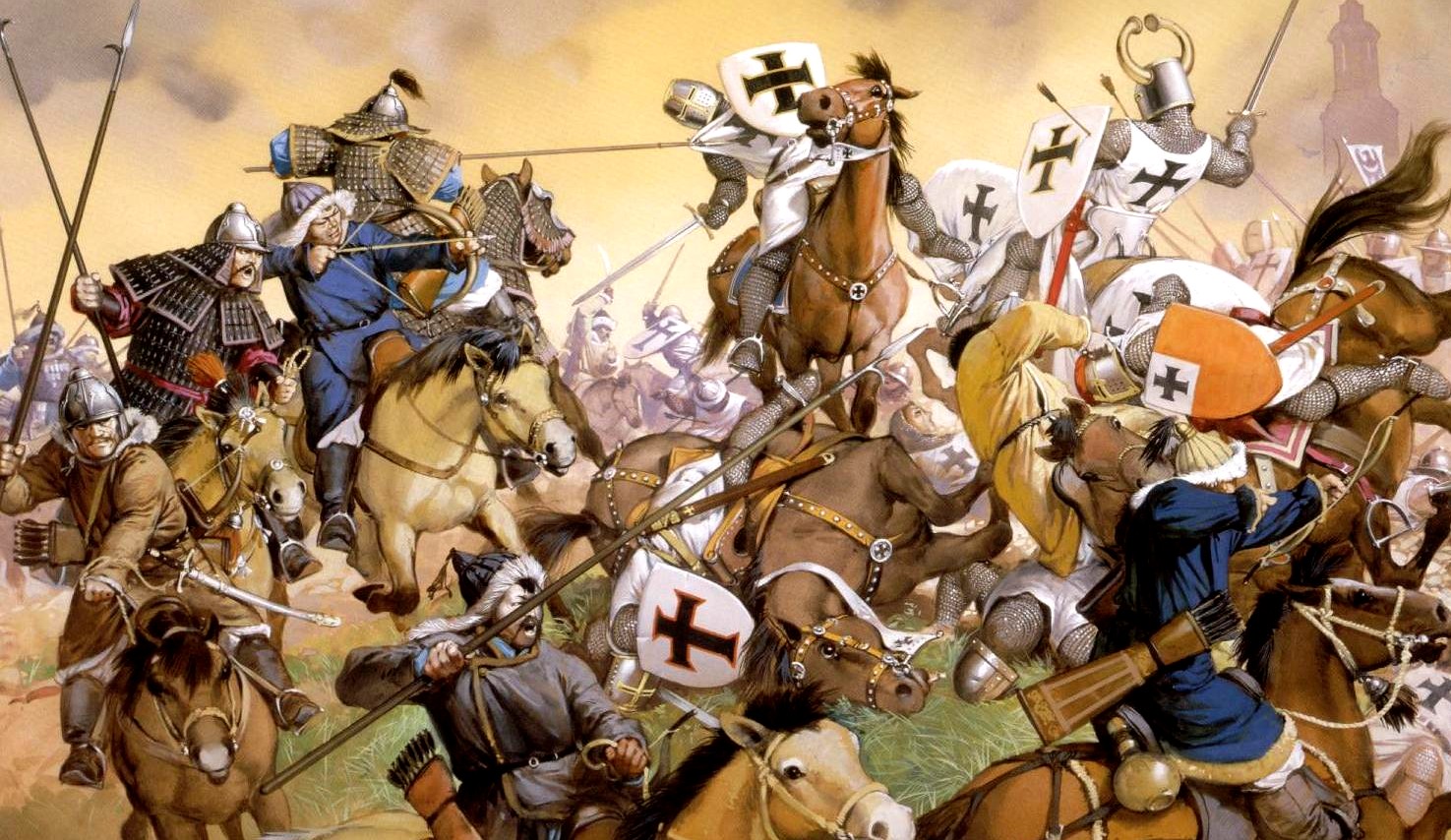 If you were to look at the various different regional civilizations in the world around the 13th century, you would not have bet on Western civilization to be the one to beat out the others and become dominant world-wide. The Song Chinese and the Caliphate had their problems but they had far more wealth, population, resources, and even coherent organization. Now, historians like Niall Ferguson have pointed out that there's various reasons why the West took the lead in the race of civilizations: fortunate developments in capitalism and science, the lack of a centralized European 'empire' may actually have allowed innovation to thrive, and we were able to develop a concept of humanism that placed the rights of the individual over the collective. But none of that might have been enough, if it wasn't for the simple fact that Genghis Khan's Mongols devastated all the competition but us. Because the Mongols weren't able to break past the wall of Poland and Hungary, Western cities weren't razed to the ground, our populations weren't devastated, our people weren't reduced to vassals of the Golden Horde, and maybe most importantly, our cultural psyche didn't turn backward and inward like what happened in post-Mongol China and the Middle East. Also, thanks to Genghis Khan, not only did our major competitors get screwed, but we also ended up getting a bunch of cool stuff.
If you were to look at the various different regional civilizations in the world around the 13th century, you would not have bet on Western civilization to be the one to beat out the others and become dominant world-wide. The Song Chinese and the Caliphate had their problems but they had far more wealth, population, resources, and even coherent organization. Now, historians like Niall Ferguson have pointed out that there's various reasons why the West took the lead in the race of civilizations: fortunate developments in capitalism and science, the lack of a centralized European 'empire' may actually have allowed innovation to thrive, and we were able to develop a concept of humanism that placed the rights of the individual over the collective. But none of that might have been enough, if it wasn't for the simple fact that Genghis Khan's Mongols devastated all the competition but us. Because the Mongols weren't able to break past the wall of Poland and Hungary, Western cities weren't razed to the ground, our populations weren't devastated, our people weren't reduced to vassals of the Golden Horde, and maybe most importantly, our cultural psyche didn't turn backward and inward like what happened in post-Mongol China and the Middle East. Also, thanks to Genghis Khan, not only did our major competitors get screwed, but we also ended up getting a bunch of cool stuff. -
7.
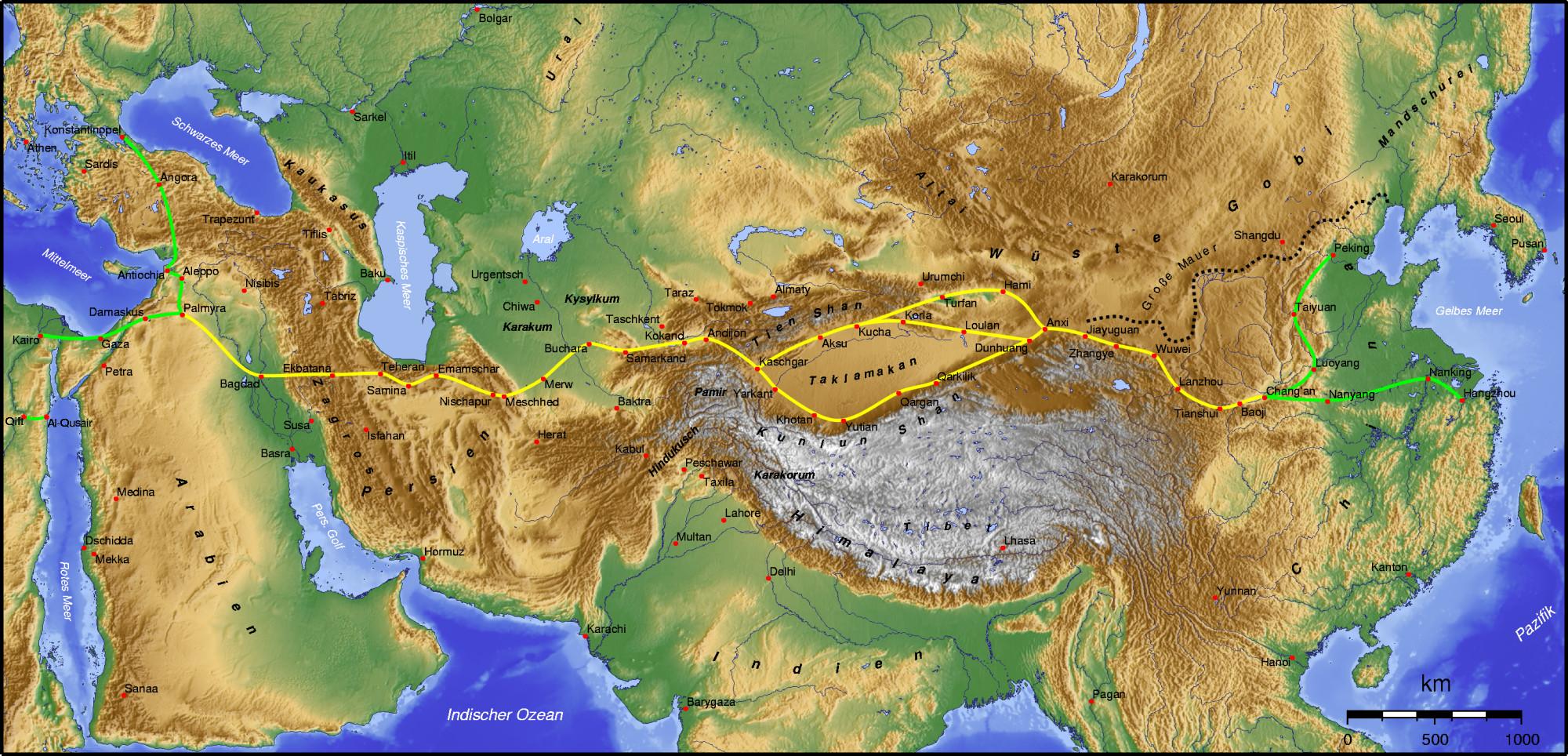 The West's eventual jump in technology and innovation, as well as in capitalism and commerce, was enormously helped by one thing Genghis did. He didn't do it to help us, but he clearly did do it on purpose: he took over and opened up the Silk Road. The Silk Road is the trade route between China and the Middle East as well as southern Europe. And specifically, the part between Persia (modern day Iran) and Western China. This was, before the advent of more advanced navigation, a vital lane for the shipping of goods, but also of ideas. And before Genghis, it was a wreck. It had worked very well around the Roman times, when the Han Dynasty controlled one end and the Persians the other, but by the 13th century the whole road was an incredibly dangerous mix of tiny city-states, weak little kingdoms, and vast no-mans-lands filled with bandits. Genghis wanted all the sweet riches that the Silk Road would provide through trade, so he swept through the region with 100000 men and took it all. Whole cities, some of them thousands of years old, ceased to exist if they defied him. Remember the Khwarazmian Empire? Yeah, no one does. That's because they defied Genghis. It ceased to exist. Genghis' Mongols slaughtered well over a million people in that campaign alone. But after all this bloodshed, something very important happened: the Mongol-controlled silk road was open, safer, and didn't require any border checks because it was unified. Bandits were ruthlessly pursued. Merchants from Europe (like Marco Polo) could now travel through it with much greater safety than would have been possible before (not that it was 'safe' by modern standards, just a lot safer than it was a century earlier). Genghis even set up one of the first international postage systems along the Silk Road, with offices lined up along the route that allowed messages to travel at a stunning rate of about 150 miles a day! This brought commerce to Europe that sped up its development. It also brought several important new inventions; like paper money, and the printing press. These weren't Mongol inventions, they were mostly thought up by the Song Chinese, but until Genghis opened the Silk Road they couldn't get to Europe. There was another very important invention (also invented by the Chinese) that Genghis would bring to the west, one that would help the West eventually conquer the world: gunpowder.
The West's eventual jump in technology and innovation, as well as in capitalism and commerce, was enormously helped by one thing Genghis did. He didn't do it to help us, but he clearly did do it on purpose: he took over and opened up the Silk Road. The Silk Road is the trade route between China and the Middle East as well as southern Europe. And specifically, the part between Persia (modern day Iran) and Western China. This was, before the advent of more advanced navigation, a vital lane for the shipping of goods, but also of ideas. And before Genghis, it was a wreck. It had worked very well around the Roman times, when the Han Dynasty controlled one end and the Persians the other, but by the 13th century the whole road was an incredibly dangerous mix of tiny city-states, weak little kingdoms, and vast no-mans-lands filled with bandits. Genghis wanted all the sweet riches that the Silk Road would provide through trade, so he swept through the region with 100000 men and took it all. Whole cities, some of them thousands of years old, ceased to exist if they defied him. Remember the Khwarazmian Empire? Yeah, no one does. That's because they defied Genghis. It ceased to exist. Genghis' Mongols slaughtered well over a million people in that campaign alone. But after all this bloodshed, something very important happened: the Mongol-controlled silk road was open, safer, and didn't require any border checks because it was unified. Bandits were ruthlessly pursued. Merchants from Europe (like Marco Polo) could now travel through it with much greater safety than would have been possible before (not that it was 'safe' by modern standards, just a lot safer than it was a century earlier). Genghis even set up one of the first international postage systems along the Silk Road, with offices lined up along the route that allowed messages to travel at a stunning rate of about 150 miles a day! This brought commerce to Europe that sped up its development. It also brought several important new inventions; like paper money, and the printing press. These weren't Mongol inventions, they were mostly thought up by the Song Chinese, but until Genghis opened the Silk Road they couldn't get to Europe. There was another very important invention (also invented by the Chinese) that Genghis would bring to the west, one that would help the West eventually conquer the world: gunpowder. -
8.
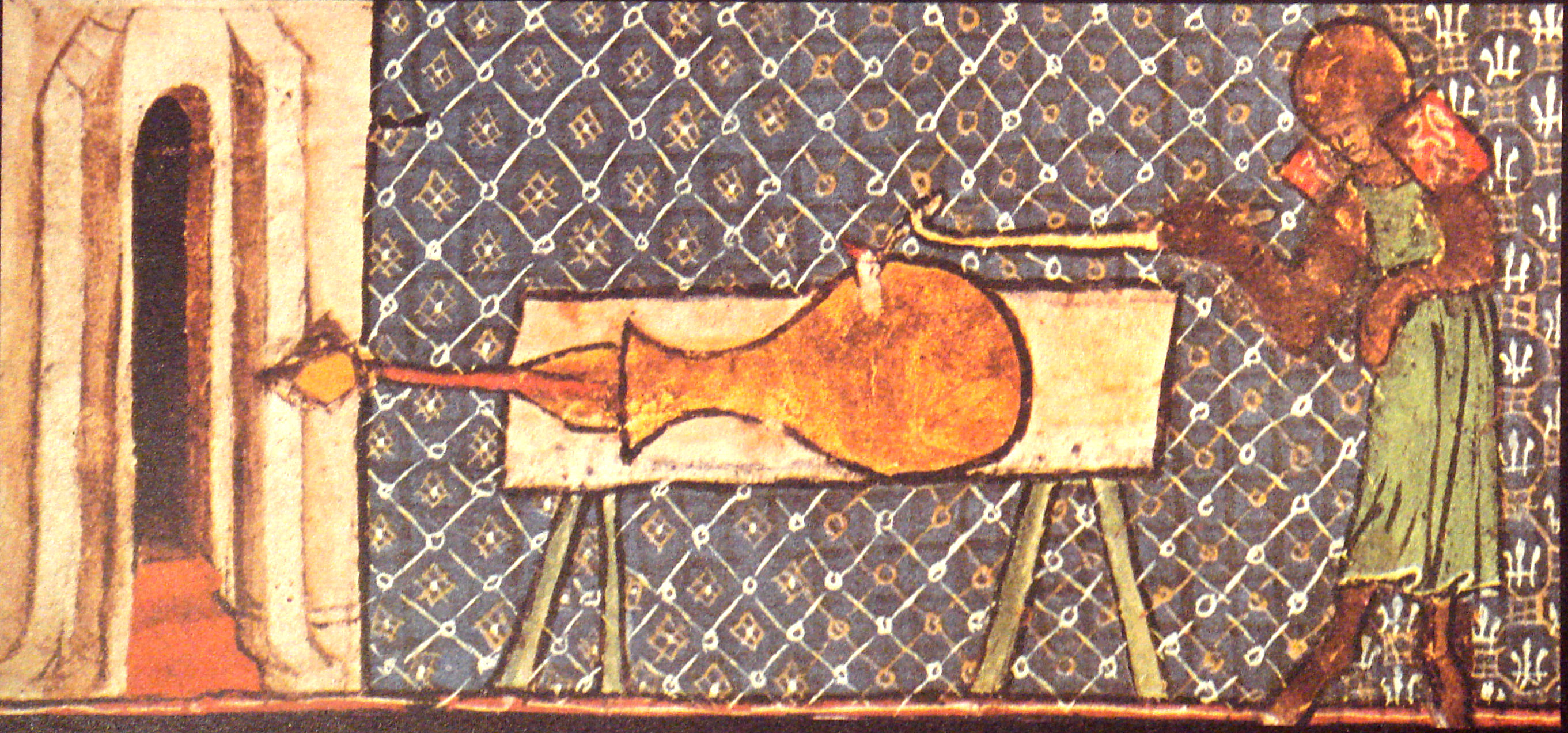 Without Genghis Khan, gunpowder might have taken much longer to reach Europe. It shows just how messed up the Silk Road was, before Genghis cleaned it up, that gunpowder had already been around for about 400 years before it finally got to Europe! Gunpowder was a 9th century invention of the Chinese Tang Dynasty (that's the one before the Song Dynasty that Genghis destroyed). Historians debate about how gunpowder did finally get to Europe; there's two major theories, and both are Genghis' fault. The first is that gunpowder began to arrive from the opening up of the Silk Road in the 1230s. The second, is that it was the Golden Horde that brought it to Europe, to use it against the Europeans! We know that the Mongols used gunpowder weapons against the Hungarians in 1241, and this is the earliest record of gunpowder being used in the West anywhere. Of course, once we saw gunpowder, and however we ended up getting it, westerners quickly adopted this technology for our own use. Europeans may have had cannons of their own less than ten years after the Mongols were using them again us. Genghis did us all a solid (even if he didn't mean to) by wiping out our competitors and showing us gunpowder, but it was Western Civilization's talent for innovation and openness to new ideas that let us use that advantage to get ahead.
Without Genghis Khan, gunpowder might have taken much longer to reach Europe. It shows just how messed up the Silk Road was, before Genghis cleaned it up, that gunpowder had already been around for about 400 years before it finally got to Europe! Gunpowder was a 9th century invention of the Chinese Tang Dynasty (that's the one before the Song Dynasty that Genghis destroyed). Historians debate about how gunpowder did finally get to Europe; there's two major theories, and both are Genghis' fault. The first is that gunpowder began to arrive from the opening up of the Silk Road in the 1230s. The second, is that it was the Golden Horde that brought it to Europe, to use it against the Europeans! We know that the Mongols used gunpowder weapons against the Hungarians in 1241, and this is the earliest record of gunpowder being used in the West anywhere. Of course, once we saw gunpowder, and however we ended up getting it, westerners quickly adopted this technology for our own use. Europeans may have had cannons of their own less than ten years after the Mongols were using them again us. Genghis did us all a solid (even if he didn't mean to) by wiping out our competitors and showing us gunpowder, but it was Western Civilization's talent for innovation and openness to new ideas that let us use that advantage to get ahead. -
9.
 You might have heard this one before. Genghis Khan had a lot of kids. And they had a lot of kids. And they had them all around the known world. The habit of having multiple wives (Genghis had 11), and concubines led to Genghis having an incredible number of grandkids, and countless great-grandkids. And since the Mongol empire spanned all of the known world at that point, it meant that Genghis' Great-Grandkids were Mongolian, Chinese, Persian, Siberian, Afghan, Indian, Korean, Russian, Turkish, Georgian and Romanian. Probably more, too. It sounds crazy, but approximately 1 in every 200 people alive today are descended from Genghis Khan. Of course, MOST of these are in Asia, but definitely not all. There's quite a lot of people who look completely Caucasian today, but actually have Genghis for a great-great-great-great-great-great-Grandpa. You might be one of them.
You might have heard this one before. Genghis Khan had a lot of kids. And they had a lot of kids. And they had them all around the known world. The habit of having multiple wives (Genghis had 11), and concubines led to Genghis having an incredible number of grandkids, and countless great-grandkids. And since the Mongol empire spanned all of the known world at that point, it meant that Genghis' Great-Grandkids were Mongolian, Chinese, Persian, Siberian, Afghan, Indian, Korean, Russian, Turkish, Georgian and Romanian. Probably more, too. It sounds crazy, but approximately 1 in every 200 people alive today are descended from Genghis Khan. Of course, MOST of these are in Asia, but definitely not all. There's quite a lot of people who look completely Caucasian today, but actually have Genghis for a great-great-great-great-great-great-Grandpa. You might be one of them. -
10.
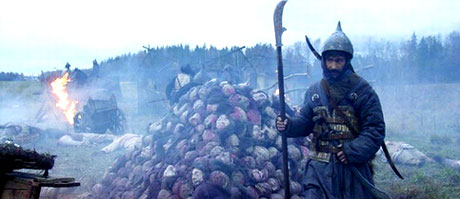 Genghis made a lot of new humans, it's true. But he also slaughtered tons and tons of them. Way more than anyone before him. Genghis Khan's personal death toll (not him, literally, but from his plan for Mongol world conquest) was probably over 40 million people. Now, at first glance, that alone puts him roughly in league with some of the great mass-murderers of the 20th century like Hitler, Stalin, or Mao. But you have to adjust for inflation! Keep in mind that in Hitler and Stalin's time, the worldwide population was 2.3 Billion. But when Genghis was murdering entire cities, the world population was only somewhere between 350-400 Million. Genghis Khan killed 11% of the population of the entire world. That means his 40 Million, converted to 1940s numbers, would be like if he'd killed 253 Million people, way more than Hitler, Stalin, or Mao managed to do. If we credit every death in WWII to Hitler (66 million), and total up the best estimates of deaths caused by worldwide Communism (94 Million), that's still only 160 Million. That means that proportionally speaking, Genghis Khan killed more people than Hitler, Stalin and Mao put together. Oh, and in today's numbers? If Genghis had been doing his killing in 2016, wiping out 11% of the population would mean killing over 800 Million people.
Genghis made a lot of new humans, it's true. But he also slaughtered tons and tons of them. Way more than anyone before him. Genghis Khan's personal death toll (not him, literally, but from his plan for Mongol world conquest) was probably over 40 million people. Now, at first glance, that alone puts him roughly in league with some of the great mass-murderers of the 20th century like Hitler, Stalin, or Mao. But you have to adjust for inflation! Keep in mind that in Hitler and Stalin's time, the worldwide population was 2.3 Billion. But when Genghis was murdering entire cities, the world population was only somewhere between 350-400 Million. Genghis Khan killed 11% of the population of the entire world. That means his 40 Million, converted to 1940s numbers, would be like if he'd killed 253 Million people, way more than Hitler, Stalin, or Mao managed to do. If we credit every death in WWII to Hitler (66 million), and total up the best estimates of deaths caused by worldwide Communism (94 Million), that's still only 160 Million. That means that proportionally speaking, Genghis Khan killed more people than Hitler, Stalin and Mao put together. Oh, and in today's numbers? If Genghis had been doing his killing in 2016, wiping out 11% of the population would mean killing over 800 Million people. -
11.
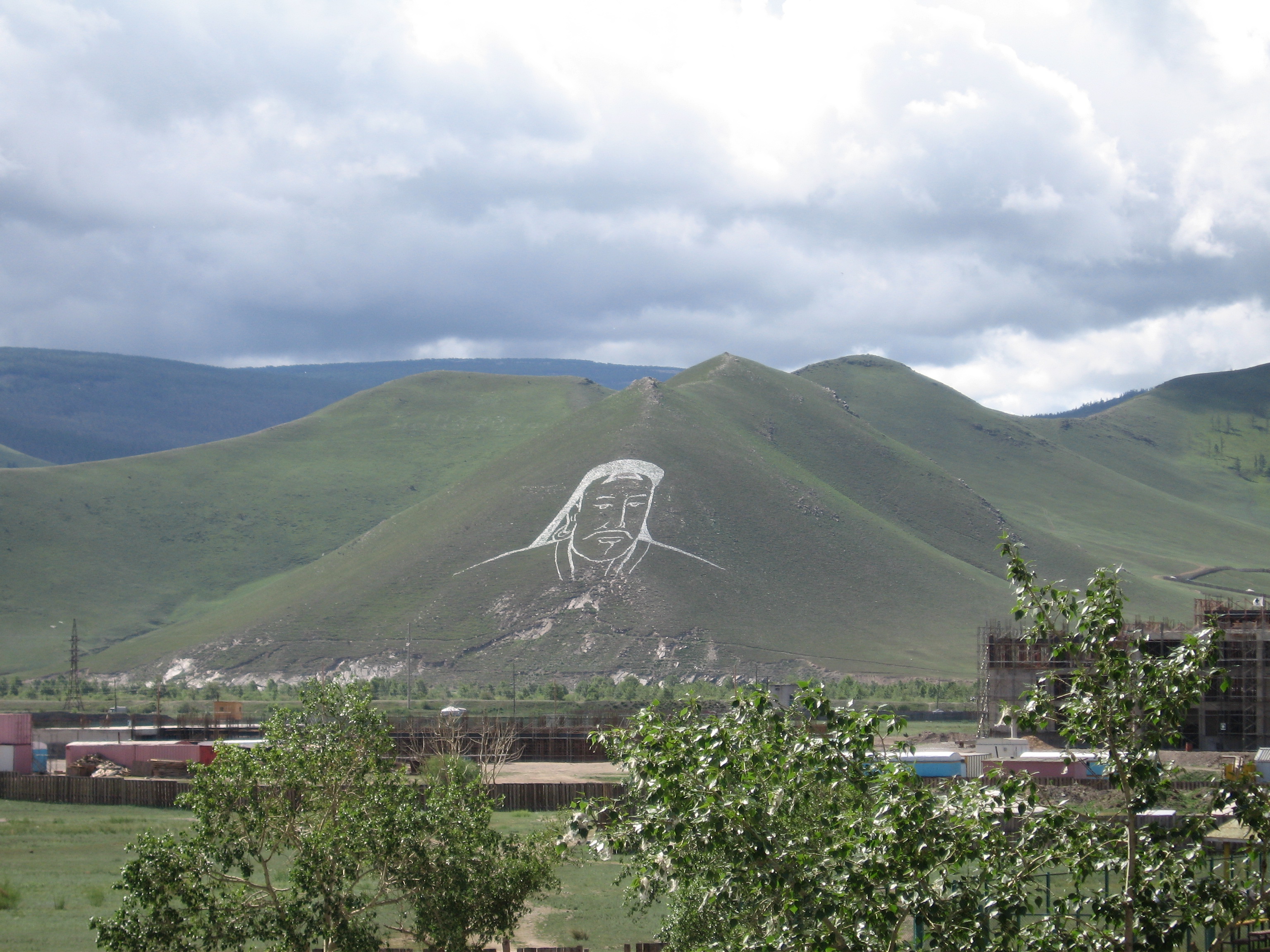 Environmental scientists now believe that Genghis Khan killed so many people that it actually caused climate change. Human beings didn't just start affecting their environment when we struck oil, we've been doing it at least since we invented agriculture. More humans means more farmlands, and deforestation. By the 13th Century there were huge areas of Asia and Europe that had once been massive forests full of wildlife, that were changed into miles and miles of farmland for crops. Trees that were chopped down were burned as firewood, which is actually a lot dirtier than oil: wood-fuel gives off more carbon emissions per kilowatt-hour than gasoline, and a single wood stove gives off more particle emissions in a day than a modern car does in a year. When Genghis' Mongol hordes swept across the world, he literally caused cities to cease to exist. He destroyed whole countries, entire kingdoms were just gone. Nations that defied him were almost completely slaughtered, and several accounts speak of great pyramids of human heads piled up from the decapitations of men, women and children from lands that tried to resist Mongol subjugation. When Genghis was done, we know that large areas of the world became so depopulated that reforestation took place. Places that were once full of towns, villages and farmland went back to being wilderness full of forests. The net effect was a reduction of about 700 million tons of carbon from the atmosphere (which is about what we produce from oil consumption in a year). A few years ago, when this became popular knowledge, you even had some environmentalist activists hailing Genghis Khan as an "eco-warrior" and a "green hero". Let's hope that the people who really think killing 11% of the world's population makes you an "environmentalist hero" don't ever get to follow Genghis' footsteps.
Environmental scientists now believe that Genghis Khan killed so many people that it actually caused climate change. Human beings didn't just start affecting their environment when we struck oil, we've been doing it at least since we invented agriculture. More humans means more farmlands, and deforestation. By the 13th Century there were huge areas of Asia and Europe that had once been massive forests full of wildlife, that were changed into miles and miles of farmland for crops. Trees that were chopped down were burned as firewood, which is actually a lot dirtier than oil: wood-fuel gives off more carbon emissions per kilowatt-hour than gasoline, and a single wood stove gives off more particle emissions in a day than a modern car does in a year. When Genghis' Mongol hordes swept across the world, he literally caused cities to cease to exist. He destroyed whole countries, entire kingdoms were just gone. Nations that defied him were almost completely slaughtered, and several accounts speak of great pyramids of human heads piled up from the decapitations of men, women and children from lands that tried to resist Mongol subjugation. When Genghis was done, we know that large areas of the world became so depopulated that reforestation took place. Places that were once full of towns, villages and farmland went back to being wilderness full of forests. The net effect was a reduction of about 700 million tons of carbon from the atmosphere (which is about what we produce from oil consumption in a year). A few years ago, when this became popular knowledge, you even had some environmentalist activists hailing Genghis Khan as an "eco-warrior" and a "green hero". Let's hope that the people who really think killing 11% of the world's population makes you an "environmentalist hero" don't ever get to follow Genghis' footsteps. -
12.
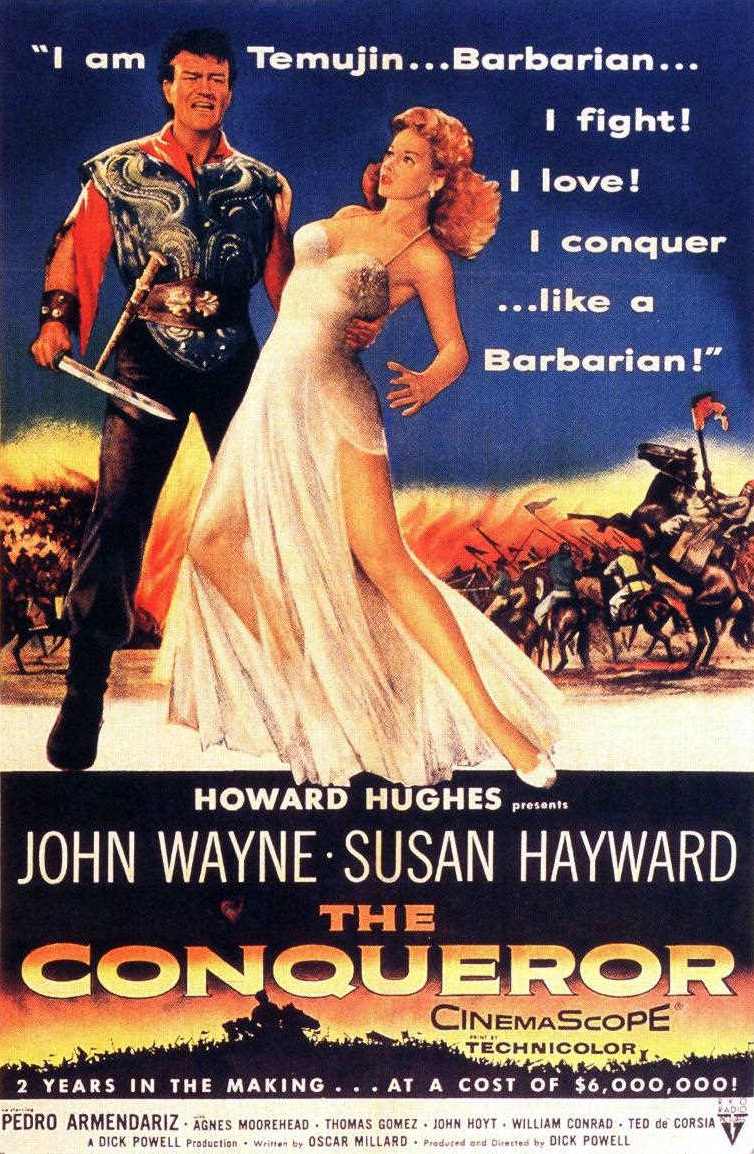 Dying in 1227 didn't stop Genghis Khan from being responsible for the deaths of millions more people through his heirs carrying on with the Mongol conquests. But incredibly, Genghis was at least partly responsible for the death of around 90 people in the 20th century, and one of them was John Wayne. Mind you, it wasn't just Gengis. It was also radioactivity. John Wayne, famous for his cowboy movies and slightly less famous for his war movies, decided for some crazy reason to take up a role in a movie called "The Conqueror", where yes, "the duke" played Genghis himself! Besides being the weirdest casting choice of all time, John Wayne as Genghis Khan also ended up being likely responsible for his death years later. Why? Because they filmed in a desert directly downwind from an area where the US Army had recently done Nuclear detonations. The radioactivity they were exposed to was the likely cause for the fact that almost half of the people involved in "The Conqueror" ended up getting cancer. Wayne himself got lung cancer a few years after filming The Conqueror, and eventually died of stomach cancer. Wayne had apparently pushed hard to get the starring role in the movie. He really wanted to take a shot at playing something different than what he was known for. If it hadn't been for Genghis Khan, Wayne might have just stuck to cowboy movies, or done a romantic-comedy or something. Instead, the Conqueror cost Wayne his health, eventually took his life, and it wasn't even a good film.
Dying in 1227 didn't stop Genghis Khan from being responsible for the deaths of millions more people through his heirs carrying on with the Mongol conquests. But incredibly, Genghis was at least partly responsible for the death of around 90 people in the 20th century, and one of them was John Wayne. Mind you, it wasn't just Gengis. It was also radioactivity. John Wayne, famous for his cowboy movies and slightly less famous for his war movies, decided for some crazy reason to take up a role in a movie called "The Conqueror", where yes, "the duke" played Genghis himself! Besides being the weirdest casting choice of all time, John Wayne as Genghis Khan also ended up being likely responsible for his death years later. Why? Because they filmed in a desert directly downwind from an area where the US Army had recently done Nuclear detonations. The radioactivity they were exposed to was the likely cause for the fact that almost half of the people involved in "The Conqueror" ended up getting cancer. Wayne himself got lung cancer a few years after filming The Conqueror, and eventually died of stomach cancer. Wayne had apparently pushed hard to get the starring role in the movie. He really wanted to take a shot at playing something different than what he was known for. If it hadn't been for Genghis Khan, Wayne might have just stuck to cowboy movies, or done a romantic-comedy or something. Instead, the Conqueror cost Wayne his health, eventually took his life, and it wasn't even a good film. -
13.
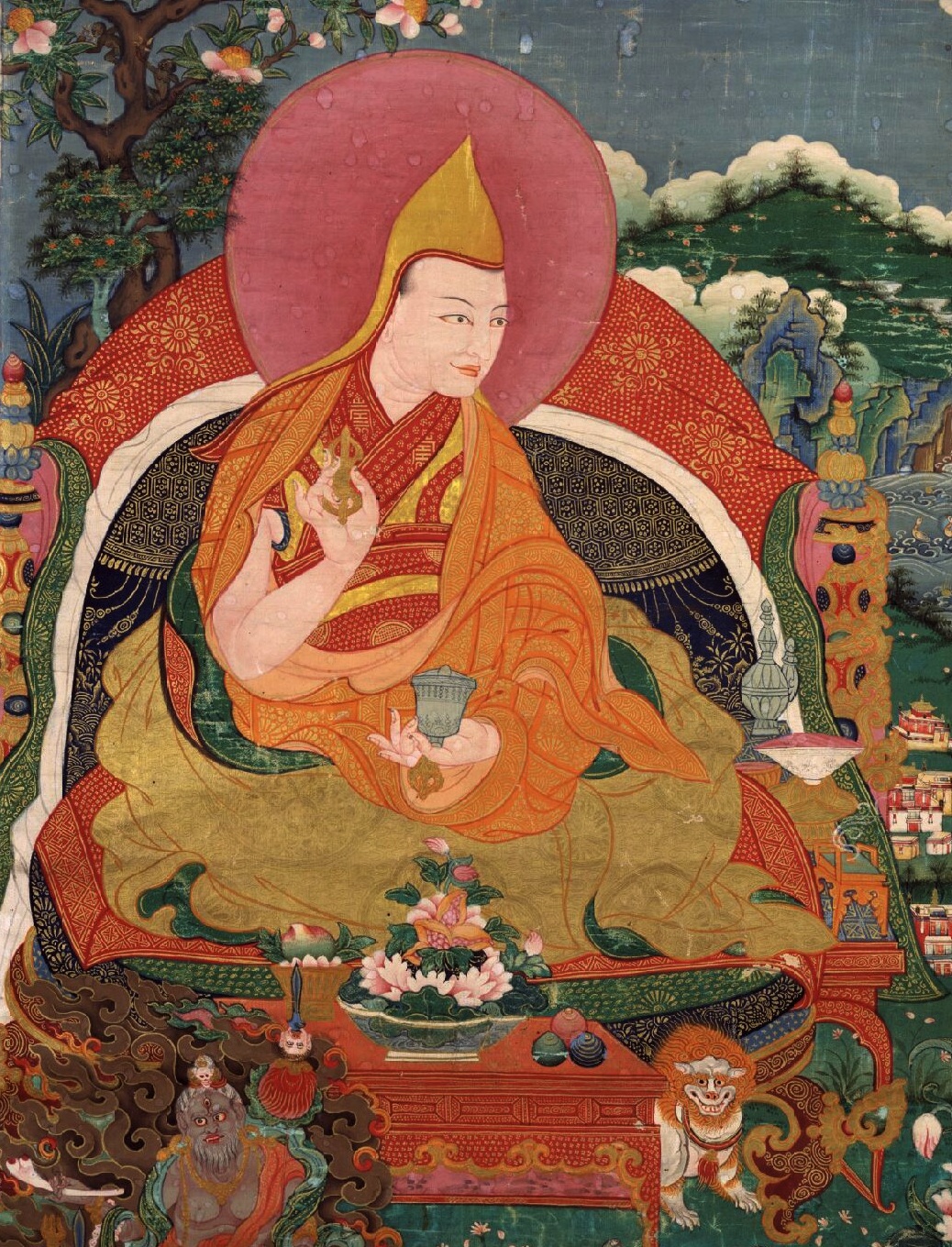 When you think of the Dalai Lama, "thanks to Genghis Khan" is probably not the first thing on your mind. But in fact, if it were not for Genghis Khan, the Dalai Lama wouldn't even exist. And I don't mean in some vague indirect way like a side-effect; I mean that the office, the power, and even the title of "Dalai Lama" was totally invented by the Mongols. You see, westerners tend to think of the Dalai Lama and Tibetan Buddhist monks in general as these nice peace-loving folks that are detached from worldly affairs, but remember that up until the Chinese kicked them out in the 1950s, the Lamas were the rulers of a Theocratic State. The early Dalai Lamas weren't just monks, they were politicians. Before the Mongols intervened, Tibet was a Kingdom run by nobles, and with a variety of different monasteries and monastic orders with different levels of authority based largely on popularity. There was one abbot named Sonam Gyatso who was the leader of a minority sect (at that time) called the Gelugpa ("yellow hats"). They were not super popular in Tibet, but Gyatso knew that many Mongolians were converting to Buddhism, so he arranged a visit to Mongolia to try to secure himself the ruler Altan Khan (the descendant of Genghis) as his patron. It worked. He converted Mongolia to Tibetan Buddhism, and by declaring that Altan was the reincarnation of the great Kublai Khan, he got Altan to back him in turn and declare him the great teacher of Buddhism. The Khan gave Gyatso the title of "Dalai Lama"; "dalai" is a Mongolian word, not a Tibetan one, and it means 'ocean' (as in 'ocean of teaching'). But the story doesn't stop there. Gyatso gave the title retroactively to the two previous heads of his order, so he became the "3rd" Dalai Lama even though he was the first to have that actual title. When he died, the 4th Dalai Lama ended up being Altan Khan's Great Grandson (and by extension, a direct descendant of Genghis). And the 5th Dalai Lama ended up just deciding that with all these Mongols backing him up, he may as well take over the country. They essentially staged a coup, and that's how the Gelug sect and the Dalai Lama ended up being the all-powerful Theocrats of Tibet, even though they were supposed to be impoverished monks, and even though other schools of Tibetan Buddhism were much more popular at the time. Ironically, Genghis Khan was also partly responsible for the Dalai Lama being thrown out of Tibet. The People's Republic Of China invaded Tibet claiming that it had a historical right over Tibet tracing back to Tibet having been a Mongol territory. In other words, that because the same Mongols who conquered China also conquered Tibet, it meant China had a right to Tibet. You could almost say the Dalai Lama and the Gelugs were finally paying back some karma there. Anyways, it's obvious that Genghis Khan's bloodthirsty ambitions keep right on affecting the world even 800 years after his time.
When you think of the Dalai Lama, "thanks to Genghis Khan" is probably not the first thing on your mind. But in fact, if it were not for Genghis Khan, the Dalai Lama wouldn't even exist. And I don't mean in some vague indirect way like a side-effect; I mean that the office, the power, and even the title of "Dalai Lama" was totally invented by the Mongols. You see, westerners tend to think of the Dalai Lama and Tibetan Buddhist monks in general as these nice peace-loving folks that are detached from worldly affairs, but remember that up until the Chinese kicked them out in the 1950s, the Lamas were the rulers of a Theocratic State. The early Dalai Lamas weren't just monks, they were politicians. Before the Mongols intervened, Tibet was a Kingdom run by nobles, and with a variety of different monasteries and monastic orders with different levels of authority based largely on popularity. There was one abbot named Sonam Gyatso who was the leader of a minority sect (at that time) called the Gelugpa ("yellow hats"). They were not super popular in Tibet, but Gyatso knew that many Mongolians were converting to Buddhism, so he arranged a visit to Mongolia to try to secure himself the ruler Altan Khan (the descendant of Genghis) as his patron. It worked. He converted Mongolia to Tibetan Buddhism, and by declaring that Altan was the reincarnation of the great Kublai Khan, he got Altan to back him in turn and declare him the great teacher of Buddhism. The Khan gave Gyatso the title of "Dalai Lama"; "dalai" is a Mongolian word, not a Tibetan one, and it means 'ocean' (as in 'ocean of teaching'). But the story doesn't stop there. Gyatso gave the title retroactively to the two previous heads of his order, so he became the "3rd" Dalai Lama even though he was the first to have that actual title. When he died, the 4th Dalai Lama ended up being Altan Khan's Great Grandson (and by extension, a direct descendant of Genghis). And the 5th Dalai Lama ended up just deciding that with all these Mongols backing him up, he may as well take over the country. They essentially staged a coup, and that's how the Gelug sect and the Dalai Lama ended up being the all-powerful Theocrats of Tibet, even though they were supposed to be impoverished monks, and even though other schools of Tibetan Buddhism were much more popular at the time. Ironically, Genghis Khan was also partly responsible for the Dalai Lama being thrown out of Tibet. The People's Republic Of China invaded Tibet claiming that it had a historical right over Tibet tracing back to Tibet having been a Mongol territory. In other words, that because the same Mongols who conquered China also conquered Tibet, it meant China had a right to Tibet. You could almost say the Dalai Lama and the Gelugs were finally paying back some karma there. Anyways, it's obvious that Genghis Khan's bloodthirsty ambitions keep right on affecting the world even 800 years after his time.
- NEXT GALLERY
-

- 24 Girls Eating A Banana!
Genghis Khan was one of the most important figures in human history. Not just because of what he did himself, but also because of all that happened as a consequence of what he did. Most of what he actually did involved slaughtering a whole crap-load of people, and running a shockingly large barbarian empire. By 1279 (about 50 years after his death), the empire he started was the largest territorial empire in human history. But the consequences of his actions were that he changed the entire world: in some ways, his actions completely messed up the world, in others, you could say he made the world better (at least, in the 'big picture'). Regardless, the modern would probably look nothing like it does now if someone had strangled this guy in his crib. He's a rule-breaking time-traveler's wet dream. So let's take a look at some of the biggest changes in world history that happened only because of this bloodthirsty barbarian warlord!
13/13
1/13
Categories:
Wow


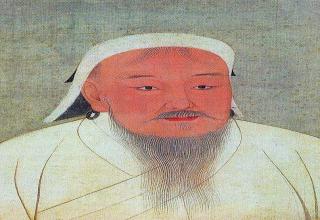







0 Comments